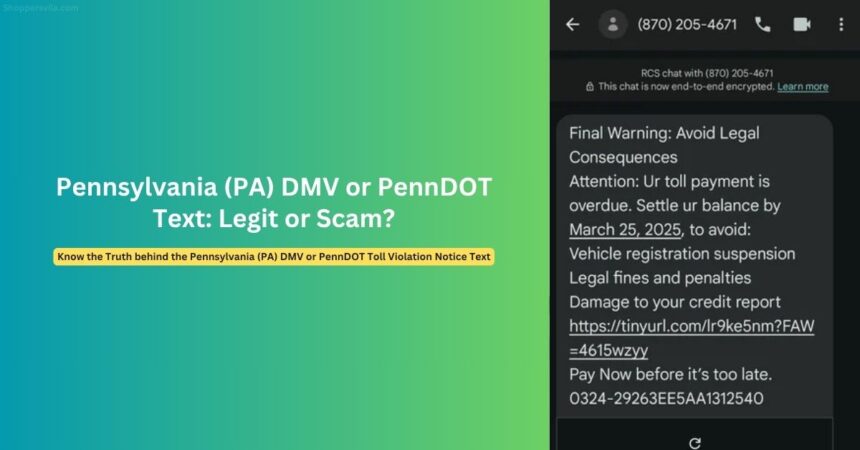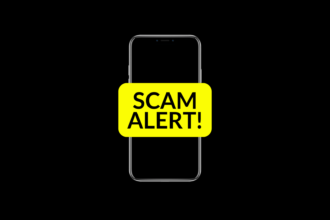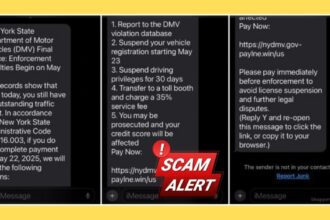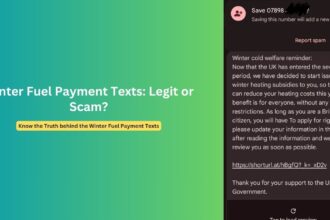Pennsylvania residents are being targeted by a sophisticated text message scam that falsely claims to be from the “Pennsylvania DMV” or “PA DMV” demanding immediate payment for unpaid toll violations. What makes this scam particularly deceptive—and immediately identifiable as fraudulent—is a critical fact many residents don’t realize: Pennsylvania doesn’t have a “Department of Motor Vehicles.” Vehicle services in Pennsylvania are handled by PennDOT (Pennsylvania Department of Transportation).
This scam represents the latest evolution in a coordinated, multi-state criminal operation that has been systematically targeting Americans since April 2024. The same criminal enterprise has already deployed similar scams in Tennessee, New York, Illinois, and other states, adapting their fraudulent messages for local conditions while making critical errors that expose their illegitimate nature.
The Pennsylvania version is particularly concerning because it’s part of a multi-vector attack targeting residents through simultaneous impersonation of the PA Turnpike, Pennsylvania Courts, collection agencies, and now the non-existent “PA DMV.” This comprehensive approach represents the most sophisticated government impersonation campaign documented to date, requiring enhanced vigilance and awareness from all Pennsylvania residents.
Overview of the Pennsylvania (PA) DMV or PennDOT Tollway Text Scam
The Pennsylvania DMV tollway text scam operates as part of a coordinated international criminal enterprise that has been systematically targeting multiple states since spring 2024. What distinguishes the Pennsylvania campaign is its unprecedented scope, with criminals simultaneously impersonating multiple government agencies and legitimate business entities in a comprehensive fraud assault on state residents.
The scam exploits Pennsylvanians’ familiarity with legitimate toll roads, particularly the Pennsylvania Turnpike system, by creating urgency around fake violations that supposedly require immediate payment. However, the criminals have made a fundamental error that immediately exposes their fraud: they reference the “Pennsylvania DMV” or “PA DMV,” which doesn’t exist.
Pennsylvania’s actual government structure handles vehicle services through PennDOT (Pennsylvania Department of Transportation), not a separate Department of Motor Vehicles. This critical mistake provides Pennsylvania residents with an immediate red flag that any message referencing “PA DMV” is automatically fraudulent, similar to how Tennessee residents can immediately identify toll scams as fake since Tennessee has no toll roads.
The criminal operation demonstrates sophisticated capabilities including mass text messaging systems, professional website design, and coordinated multi-state deployment. However, their use of generic templates without proper state-specific research creates consistent vulnerabilities that informed residents can exploit to protect themselves.
Intelligence analysis suggests this is an international operation, with documented cases showing messages originating from Philippines (+63) and UK (+44) phone numbers. The scale and persistence of the campaign, continuing for over a year despite widespread law enforcement and media attention, indicates significant financial returns that justify continued criminal investment.
The Pennsylvania campaign has evolved through multiple phases, beginning with basic PA Turnpike impersonation in April 2024, progressing through collection agency impersonation in February 2025, expanding to Pennsylvania Courts impersonation in May 2025, and now including the current “PA DMV” impersonation phase. This evolution demonstrates the criminals’ ability to adapt and expand their tactics in response to public awareness campaigns and law enforcement countermeasures.
How the Scam Works
The Pennsylvania DMV or PennDOT tollway scam operates through a sophisticated multi-step process designed to exploit human psychology, create false urgency, and prevent victims from conducting proper verification before responding to fraudulent demands.
Step 1: Mass Target Acquisition and Distribution
Criminals obtain Pennsylvania phone numbers through various means including data breaches, social media scraping, purchased contact lists, and automated generation targeting Pennsylvania area codes. They deploy mass text messaging systems capable of reaching thousands of recipients simultaneously, knowing that statistical probability will deliver their fraudulent messages to actual Pennsylvania drivers who may have legitimate concerns about toll violations.
Step 2: Authority Impersonation and Urgency Creation
The fraudulent messages are crafted to appear official by referencing the “Pennsylvania DMV” or “PA DMV” and using authoritative language about enforcement procedures. They create artificial urgency with extremely tight deadlines—typically 12 to 48 hours—claiming that immediate action is required to avoid severe penalties. This time pressure is designed to prevent victims from taking time to verify the legitimacy of the communication through official channels.
Step 3: Fear-Based Psychological Manipulation
The messages exploit multiple psychological pressure points by threatening consequences that would significantly impact victims’ daily lives: vehicle registration suspension, court judgments, credit score damage, and possible vehicle impoundment. These threats are designed to create panic and prompt immediate compliance without critical thinking about the message’s legitimacy.
Step 4: Technical Deception and Misdirection
When victims click the provided links, they’re directed to sophisticated fake websites that closely mimic official Pennsylvania government portals. These sites use convincing design elements, official-looking logos, and professional formatting to create an illusion of legitimacy. The sites are typically hosted on international servers using deceptive domain names that appear official at first glance but use suspicious extensions and structures.
Step 5: Information Harvesting and Financial Exploitation
The fake websites request comprehensive personal and financial information under the guise of “paying” the fake violation. This includes full names, addresses, driver’s license numbers, Social Security numbers, and complete credit card information. Advanced versions may also request bank account details for “direct payment” options or ask for additional verification information that can be used for future identity theft.
Step 6: Ongoing Criminal Exploitation
Once criminals obtain victim information, they can commit immediate financial fraud through unauthorized purchases, access victims’ legitimate government accounts using stolen credentials, sell the personal information to other criminals on the dark web, or use the comprehensive data for sophisticated long-term identity theft schemes that may not be discovered for months or years.
Fake Text Patterns: Pennsylvania-Specific Examples
Analysis of actual scam texts received by Pennsylvania residents reveals consistent patterns and critical errors that expose their fraudulent nature:
Example 1: “PA DMV” Final Notice
Final Notice – Immediate Action Required: PA DMV Toll Delinquency
This is your final warning. Your toll remains unpaid. If not paid by
April 11, enforcement will proceed without further notice. You may face:
– Immediate suspension of your vehicle registration by PennDOT
– Court judgment and legal collection
– Damage to your credit score and public driving record
– Possible vehicle impoundment if found operating while suspended
Resolve it now to avoid irreversible penalties:
https://shorturl.at/FwgVe?CcS=Wv5Xa6
Example 2: “Pennsylvania DMV” Variation
Pennsylvania DMV – URGENT TOLL VIOLATION ALERT
Outstanding Balance: $12.75
Due Date: OVERDUE
Account Status: FINAL NOTICE
Failure to resolve by May 31, 2025 will result in:
1. Vehicle registration suspension
2. Driver’s license penalties
3. Additional collection fees ($45.00)
4. Credit bureau reporting
Pay immediately: https://pa-dmv.secure-payment.win/resolve
Reply STOP to opt out | Reply Y to confirm receipt
Example 3: Mixed Agency Confusion
PennDOT/PA DMV Joint Notice – Toll Enforcement Action
Your vehicle has unpaid Pennsylvania Turnpike tolls requiring
immediate attention. This final notice is issued jointly by
PennDOT and PA DMV enforcement divisions.
Amount Due: $8.99 + $15.00 late fee
Deadline: 24 HOURS
Avoid license suspension and vehicle impoundment:
https://pennsylvania.gov-tollpay.vip/urgent
Customer Service: +63 945 XXX XXXX
Critical Errors in These Examples:
- “PA DMV” reference (doesn’t exist in Pennsylvania)
- URL shorteners and suspicious domains (.win, .vip extensions)
- International phone numbers (+63 Philippines country code)
- Mixing agencies (PennDOT and non-existent PA DMV)
- Immediate deadlines creating artificial urgency
Red Flags: How to Identify PA DMV Scams
Several immediate warning signs can help Pennsylvania residents identify these fraudulent messages:
1. Agency Name Errors
| Correct Pennsylvania Agencies | Fraudulent References |
|---|---|
| PennDOT (Pennsylvania DOT) | Pennsylvania DMV |
| PA Turnpike Commission | PA DMV |
| Pennsylvania Courts | PA DMV Toll Division |
| Driver & Vehicle Services | Pennsylvania Department of Motor Vehicles |
Any reference to “Pennsylvania DMV” or “PA DMV” is automatically suspicious since this agency doesn’t exist.
2. Communication Method Red Flags
- Unsolicited text messages: Pennsylvania agencies primarily communicate through official mail
- International phone numbers: Government communications don’t originate from foreign countries
- Urgent deadlines: Legitimate agencies provide reasonable time for responses
- “Reply Y” instructions: Official services don’t require text confirmations
3. Technical Warning Signs
- URL shorteners: Government agencies use official domains, not shorturl.at or similar services
- Suspicious domains: Real Pennsylvania sites end in .pa.gov or use verified agency domains
- Mixed agency references: Legitimate communications come from single, appropriate agencies
- Generic language: Lack of specific account or violation details
4. Content and Language Indicators
- Threatening tone: Excessive urgency and scare tactics
- Impossible penalties: Threats that don’t align with actual Pennsylvania procedures
- Grammar issues: Poor spelling, unusual phrasing, or formatting errors
- Payment method requests: Demands for immediate electronic payments via links
5. Authority Structure Inconsistencies
- Jurisdiction confusion: Mixing turnpike, court, and motor vehicle authorities inappropriately
- Process violations: Threatening immediate action without proper legal procedures
- Contact information: Providing foreign phone numbers or suspicious email addresses
How to Protect Yourself from Fraudulent Pennsylvania (PA) DMV or PennDOT Texts
Implementing comprehensive protection strategies can significantly reduce your risk of falling victim to these and similar fraud attempts:
Verify Through Official Pennsylvania Channels
- PennDOT official website: www.dmv.pa.gov or www.penndot.gov
- PA Turnpike customer service: 1-877-736-6727 (Monday-Friday, 8 AM – 6 PM)
- Pennsylvania Courts: Contact appropriate court directly using verified contact information
- General verification: Never use contact information provided in suspicious messages
Implement Digital Security Best Practices
- Bookmark official sites: Save legitimate Pennsylvania government websites to avoid typing errors
- Use official mobile apps: Download PA Turnpike and PennDOT apps only from official app stores
- Enable account alerts: Set up legitimate notifications through verified Pennsylvania services
- Multi-factor authentication: Protect your real government accounts with additional security
Educational and Community Awareness
- Stay informed about current scams: Follow Pennsylvania Attorney General consumer alerts
- Family education: Ensure elderly relatives and young drivers understand these risks
- Community sharing: Discuss scam awareness in neighborhood groups and social networks
- Workplace awareness: Share information with colleagues who may be targeted
Financial Protection Measures
- Account monitoring: Check bank and credit card statements regularly for unauthorized charges
- Credit monitoring: Consider services that alert you to potential identity theft
- Fraud alerts: Place temporary alerts if you suspect your information has been compromised
- Account security: Use strong, unique passwords for all financial and government accounts
Pennsylvania-Specific Protection
- Know correct agencies: Remember that Pennsylvania uses PennDOT, not “PA DMV”
- Understand legitimate processes: Pennsylvania agencies communicate primarily through official mail
- Verify toll violations: Check PA Turnpike account through official website or customer service
- Report suspicious activity: Contact Pennsylvania Attorney General at 1-800-441-2555
What to Do If You Receive a PADMV Scam Text
If you receive a suspicious text claiming to be from the “Pennsylvania DMV” or “PA DMV,” take these immediate steps:
Immediate Response Protocol
- Do not click any links provided in the message
- Do not reply to the message, even to say “STOP” or ask questions
- Do not call any phone numbers included in the text
- Take a screenshot for reporting purposes (without sharing personal information)
- Do not forward the message to friends or family (this can spread the scam)
Comprehensive Reporting Procedures
- Pennsylvania Attorney General: Report to Consumer Protection Division at 1-800-441-2555 or [email protected]
- Federal Bureau of Investigation: File complaint with Internet Crime Complaint Center (IC3) at www.ic3.gov
- Federal Trade Commission: Report at reportfraud.ftc.gov or call 1-877-FTC-HELP
- Phone carrier: Forward message to 7726 (SPAM) and use phone’s “Report Junk” feature
- Local law enforcement: File report if you’ve suffered financial losses
If You’ve Already Responded to the Scam
If you’ve already clicked links or provided information:
- Change passwords immediately: Update all financial and government account passwords
- Contact financial institutions: Alert banks and credit card companies about potential fraud
- Monitor accounts closely: Check for unauthorized transactions or new account openings
- Credit report monitoring: Obtain free credit reports and watch for suspicious activity
- Consider credit freeze: Place temporary security freeze on credit files
- Document everything: Keep detailed records of all communications and actions taken
Verification of Legitimate Issues
- Check official PennDOT services: Visit www.dmv.pa.gov to verify any actual vehicle-related issues
- Verify PA Turnpike account: Log into official PA Turnpike website or call 1-877-736-6727
- Contact appropriate courts: If concerned about traffic violations, contact courts directly using verified information
- Consult Pennsylvania Attorney General: For general consumer protection guidance
Frequently Asked Questions
1. Is the Pennsylvania DMV (PA DMV) “Final Notice”, “Final Remeber”, or PennDOT “Unpaid Toll Violation Notice” text legitimate?
No, these texts are fraudulent. Pennsylvania does not have a “Department of Motor Vehicles” or “PA DMV.” Vehicle services in Pennsylvania are handled by PennDOT (Pennsylvania Department of Transportation). Any message referencing “Pennsylvania DMV” or “PA DMV” is automatically fraudulent. Additionally, Pennsylvania agencies do not send final notices or payment demands via unsolicited text messages. Legitimate communications come through official mail, verified online accounts, or direct contact through verified phone numbers.
2. How can I verify if I actually have outstanding toll fees or vehicle violations in Pennsylvania?
To check for legitimate issues, use only official channels: visit PennDOT’s official website at www.dmv.pa.gov or www.penndot.gov for vehicle-related matters, check your PA Turnpike account at the official PA Turnpike website or call 1-877-736-6727, or contact appropriate Pennsylvania courts directly using verified contact information. Never use contact information provided in suspicious text messages. Always navigate to official websites independently rather than clicking links in messages.
3. What personal information should I never provide in response to text messages claiming to be from Pennsylvania agencies?
Never provide your Social Security number, driver’s license number, credit card information, bank account details, PennDOT account credentials, or any passwords via text message. Legitimate Pennsylvania agencies will never request sensitive information through unsolicited text messages. When conducting legitimate business with Pennsylvania agencies, always initiate contact through verified official channels and use their secure online portals or in-person services.
4. Are there legitimate ways Pennsylvania agencies might contact me about violations or fees?
Yes, legitimate Pennsylvania communications typically come through official mail sent to your address on file, email notifications to addresses registered in your official accounts (like PA Turnpike E-ZPass), notifications when you log into official online accounts, or through customer service calls that you initiate. However, these legitimate communications will never demand immediate payment via text message links or threaten instant penalties without proper due process. When in doubt, always verify through official agency channels.
5. What should I do if I’m unsure whether a Pennsylvania agency communication is legitimate?
When in doubt, always verify independently through official channels. Do not use any contact information provided in the suspicious message. Instead, visit official Pennsylvania agency websites directly (www.penndot.gov, official PA Turnpike website), call verified customer service numbers, or visit agency offices in person. Contact the Pennsylvania Attorney General’s Consumer Protection Division at 1-800-441-2555 if you need guidance on verifying government communications. It’s always better to take time to verify than to risk becoming a victim of fraud.
Conclusion
The Pennsylvania DMV tollway text scam represents a significant escalation in the sophisticated criminal enterprise that has been systematically targeting Americans across multiple states for over a year. The criminals’ fundamental error in referencing the non-existent “Pennsylvania DMV” provides residents with an immediate identification tool, but the overall sophistication of the operation demands continued vigilance and comprehensive protection strategies.
What makes the Pennsylvania campaign particularly concerning is its multi-vector approach, with residents simultaneously facing impersonation attempts of the PA Turnpike, Pennsylvania Courts, collection agencies, and now the fictitious “PA DMV.” This comprehensive assault on public trust represents the most sophisticated government impersonation campaign documented to date and suggests that other states should prepare for similar multi-agency fraud campaigns.
The persistence of this criminal operation, continuing for over a year despite widespread law enforcement attention and media coverage, indicates substantial financial returns that justify continued criminal investment and evolution. As public awareness increases, criminals adapt their tactics, making ongoing education and verification practices essential for protection.
Pennsylvania residents have several advantages in identifying these scams: knowledge that “PA DMV” doesn’t exist, awareness of legitimate agency names and procedures, and access to verified official channels for verification. However, the criminals’ ability to create convincing fake websites and official-looking communications means that the safest approach is always independent verification through known, trusted channels.
The key to protection lies in understanding that legitimate Pennsylvania agencies follow established procedures, provide reasonable timeframes for addressing issues, and never demand immediate payment via unsolicited text messages. They don’t threaten instant penalties without due process or request sensitive information through unauthorized communication channels.
As these scams continue to evolve, staying informed through official channels becomes essential. The Pennsylvania Attorney General’s office, PennDOT, PA Turnpike Commission, and Pennsylvania Courts all provide consumer protection resources and current scam alerts. Regular monitoring of legitimate accounts and immediate verification of unexpected communications can prevent both financial loss and the long-term consequences of identity theft.
Remember that taking a few minutes to verify any unexpected government communication through official channels is always preferable to the potential months or years needed to recover from fraud. When in doubt, contact Pennsylvania authorities directly using verified contact information, not what’s provided in suspicious messages.
This article incorporates analysis of documented Pennsylvania DMV scam examples, official guidance from Pennsylvania government agencies, and consumer protection best practices. For the most current scam alerts and official resources, always consult official Pennsylvania government websites and verified agency contact information.
Stay informed about the latest scam alerts, consumer protection tips, and fraud prevention strategies with ShoppersVila.com – your trusted source for staying ahead of evolving criminal tactics and protecting your personal and financial security.










































Excellent resource; the idiot scammers also try to change the violation state from PA to GA but they leave the PA DMV references, you wish the FBI could coordinate a call center raid to catch these goons. Thank you for the great information